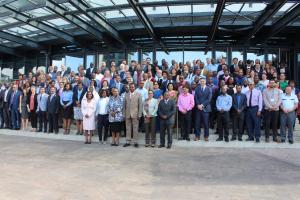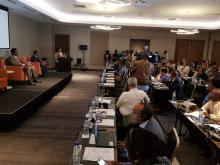WHO Alliance for the Global Elimination of Trachoma (GET2020) meets in Maputo
Maputo, 27 June 2019 - More than 180 trachoma specialists from around the world, including from Mozambique, are meeting in Maputo for the 22nd Meeting of the WHO Alliance for the Global Elimination of Trachoma (GET2020) meets in Maputo
This is the first time the forum meets in a Portuguese-speaking country. Deputy Minister of Health of Mozambique, Prof. Dr. João Leopoldo, and the WHO Representative in Mozambique, Dr Djamila Cabral led the opening session.
Trachoma is the leading infectious cause of blindness worldwide. The infection is transmitted by direct or indirect transfer of eye and nose discharges of infected people, particularly young children who harbour the principal reservoir of infection. These discharges can be spread by particular species of flies.
A mapping conducted in Mozambique between 2011 and 2014 revealed that of the country's 161 districts, 66 are endemic for follicular trachoma in school-age children in seven provinces located in central and northern Mozambique.
Progress towards the elimination of trachoma is encouraging because globally the number of people at risk for trachoma rose from 1.5 billion in 2002 to just over 142 million in 2019, a reduction of 91%.
Data presented at this 22nd meeting of the WHO Alliance for the Global Elimination of Trachoma through 2020 also show that the number of people requiring surgery for trachomata trichiasis - the late blinding stage of trachoma - dropped from 7.6 million in 2002 to 2.5 million in 2019, a reduction of 68%.
Since 1993, the World Health Organization has recommended the SAFE strategy to prevent trachoma blindness. This is an integrated package of interventions, implemented at community level, which prevents blindness caused by trachoma in multiple stages of the disease. The acronym SAFE stands for: S- Surgery for those with advanced disease, A- antibiotics to treat infection, F- Facial cleanliness and E- Environmental improvement to reduce transmission.
In 1996 the global scientific community established the WHO Alliance for the Global Elimination of Trachoma in the World by 2020 to help countries use the SAFE strategy to eliminate trachoma as a public health problem.
Speaking at the opening session the Deputy Minister of Health said Mozambique has implemented the "Vision 2020" strategy defined by WHO to coordinate efforts against avoidable blindness, eliminating its main causes and giving the right to vision to all. "Your presence strengthens the commitment to eliminate Trachoma as a cause of blindness in the world and in particular in our country," stressed the Deputy Minister of Health.
"People affected by trachoma generally live in the poorest countries,” said Dr Djamila Cabral WHO Representative in Mozambique. “Within these countries they live in the poorest communities; and in these communities, people who are blinded by trachoma are poorer than their neighbours. Being blind keeps them poor - and their children poor too."
"We need more partnerships, more resources, health system strengthening and more action to combat the problem," she added.
To address this problem, the Ministries of Health with the support of the WHO Global Alliance for the Elimination of Trachoma are undertaking efforts to implement the SAFE strategy at country level.




